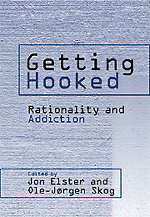Book contents
- Frontmatter
- Contents
- Preface and Acknowledgments
- Contributors
- Introduction
- Addiction and Social Interaction
- Addiction, Weakness of the Will, and Relapse
- The Dangers of Willpower
- The Neurobiology of Chemical Addiction
- To Legalize or Not to Legalize: Is That the Question?
- Rationality, Irrationality, and Addiction – Notes on Becker's and Murphy's Theory of Addiction
- Gambling and Addiction
- A Visceral Account of Addiction
- Epilogue: Rationally Coping with Lapses from Rationality
- Index
Addiction, Weakness of the Will, and Relapse
Published online by Cambridge University Press: 05 June 2012
- Frontmatter
- Contents
- Preface and Acknowledgments
- Contributors
- Introduction
- Addiction and Social Interaction
- Addiction, Weakness of the Will, and Relapse
- The Dangers of Willpower
- The Neurobiology of Chemical Addiction
- To Legalize or Not to Legalize: Is That the Question?
- Rationality, Irrationality, and Addiction – Notes on Becker's and Murphy's Theory of Addiction
- Gambling and Addiction
- A Visceral Account of Addiction
- Epilogue: Rationally Coping with Lapses from Rationality
- Index
Summary
Introduction
Addiction is a puzzle. In some cases, at least, it seems to be a form of voluntary, self-destructive behavior. It may then plausibly be taken as an instance of weakness of will, in the sense (roughly) of acting against one's better judgment. Many addicts want to quit but don't. Many smokers, for instance, believe it would be better, all things considered, if they stopped smoking, but they still continue. In this chapter, I discuss how addiction can be illuminated by two very different conceptions of weakness of will, presented by Donald Davidson and George Ainslie, respectively. Davidson offers a philosophical theory to show that weakness of will is possible, without offering any specific causal mechanism by which it might be brought about. Ainslie, by contrast, offers a highly specific causal mechanism that determines the circumstances in which a person will knowingly act against his interest. Each theory, I shall argue, has strengths and weaknesses. Each may account for some aspect of weakness of will in general, and of addiction more specifically.
For my purposes, addiction will be characterized in terms of (i) a desire to quit and (ii) the production of withdrawal symptoms when the person tries to quit. (The desire may be actual or counterfactual, the latter case being that of an addict who is unaware of the harmful consequences of addiction but would have wanted to quit had he known about them.)
- Type
- Chapter
- Information
- Getting HookedRationality and Addiction, pp. 47 - 64Publisher: Cambridge University PressPrint publication year: 1999
- 6
- Cited by



